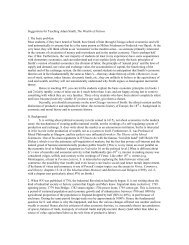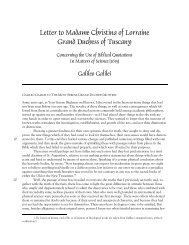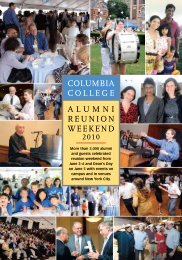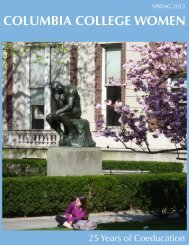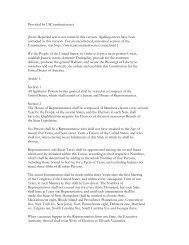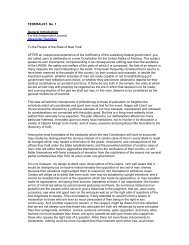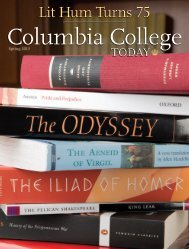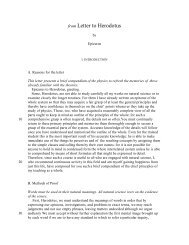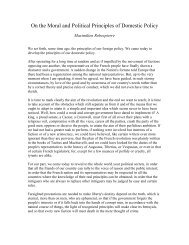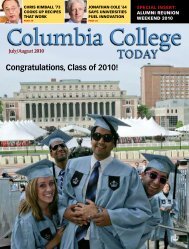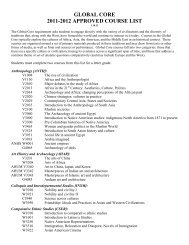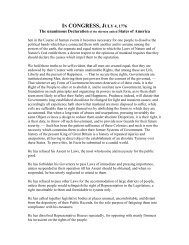Download this issue as a PDF - Columbia College - Columbia ...
Download this issue as a PDF - Columbia College - Columbia ...
Download this issue as a PDF - Columbia College - Columbia ...
You also want an ePaper? Increase the reach of your titles
YUMPU automatically turns print PDFs into web optimized ePapers that Google loves.
GOOD CHEMISTRY<br />
COLUMBIA COLLEGE TODAY<br />
COLUMBIA COLLEGE TODAY<br />
GOOD CHEMISTRY<br />
all the students to be exposed to, to learn, to experience for two<br />
re<strong>as</strong>ons. One, we view that <strong>as</strong> essential to being an educated person.<br />
That’s our expression <strong>as</strong> an institution, to say that to be an<br />
educated person we think you need to do <strong>this</strong>. But it’s also the way<br />
we build an intellectual community at <strong>Columbia</strong>. All students here<br />
have taken Lit Hum, CC, Art Hum, Music Hum — it is part of the<br />
common dialogue, the b<strong>as</strong>is on which they can relate to each other<br />
whatever else they’ve done. It builds a community, an intellectual<br />
community, and it also builds a social community. And it h<strong>as</strong> created<br />
a trans-generational community, uniting former students,<br />
current students and future students. [Trustee Emeritus] George<br />
Van Amson ’74 said that what we want is for our kids to read the<br />
books that we were supposed to read when we were undergraduates.<br />
Of course, he said that in jest, but even though the curriculum<br />
evolves, there are some commonalities that do persist over long<br />
periods. It’s not that it changes so much that it’s a completely different<br />
course than it w<strong>as</strong> 20 years ago or 40 years ago. It is something<br />
that links people. There are certain ide<strong>as</strong> that we still believe<br />
are important for students to understand and be exposed to. We’ll<br />
add new things, we’ll modify things, but there will be some that<br />
we definitely will continue to consider are important.<br />
It’s also an expression of what <strong>Columbia</strong> considers an appropriate<br />
undergraduate<br />
The Core Curriculum<br />
represents a commitment<br />
to an idea that at any one<br />
time there is a kind of<br />
collective intellectual<br />
experience and a body of<br />
knowledge, information,<br />
ide<strong>as</strong>, that we want all the<br />
students to be exposed to,<br />
to learn, to experience.<br />
education. At the opposite<br />
end are some peer institutions<br />
that have little if<br />
any fixed required curriculum.<br />
That’s an expression<br />
of a different philosophy. I<br />
won’t say that one’s inferior,<br />
but we’ve made a decision<br />
that there are certain<br />
things everyone should do.<br />
I have always agreed with<br />
that. Even though I came<br />
here to be a chemistry professor<br />
and the Core w<strong>as</strong>n’t<br />
why I w<strong>as</strong> recruited, I considered<br />
it valuable. I do<br />
think there are things everyone should be exposed to and that’s<br />
what the Core provides. I don’t care if everyone studies chemistry,<br />
I don’t think that’s important. I do think everyone should<br />
study statistics, and if I ruled the world I would have statistics <strong>as</strong><br />
part of the Core Curriculum. But I don’t rule the world, and no<br />
one singlehandedly decides what goes into<br />
the Core.<br />
Meet the Dean<br />
Not on campus but still want a<br />
chance to meet the new dean?<br />
Come join Dean James J. Valentini<br />
in the following cities <strong>this</strong> fall,<br />
with more to come in the spring.<br />
September 20 New York City<br />
October 4 W<strong>as</strong>hington, D.C.<br />
November 1 San Francisco<br />
November 5 Los Angeles<br />
For further information, log on to<br />
college.columbia.edu/alumni.<br />
This year at reunion we introduced a new<br />
event, an open house in the Richard E.<br />
Witten Center for the Core Curriculum,<br />
where alumni could see what is taught in<br />
the Core today and meet some of the Core<br />
chairs and faculty. The turnout w<strong>as</strong> amazing.<br />
It w<strong>as</strong> one of the weekend’s most<br />
popular events.<br />
It’s not just a fetish, either. It could be e<strong>as</strong>y<br />
for some people from a distance to think<br />
<strong>this</strong> is some sort of talisman and it’s not really<br />
substantive. But they’re wrong. It is the<br />
thing that former students almost uniformly<br />
mention to me <strong>as</strong> the most important or<br />
one of the most important parts of their experience.<br />
It’s not that they just mention it, they actually explain<br />
to me why it w<strong>as</strong> <strong>this</strong> valuable in their lives and how it informed<br />
their adult lives, and they speak very cogently about <strong>this</strong>. When I<br />
went to see Rob Speyer ’92, one thing he wanted to tell me about<br />
w<strong>as</strong> Jim Mirollo teaching him Lit Hum. There w<strong>as</strong> a segment of<br />
The Divine Comedy that they were reading, and he remembers it<br />
so well and how important that cl<strong>as</strong>s w<strong>as</strong> to him. He can tell you<br />
why it w<strong>as</strong> important, why it had value in his life. I think it’s really<br />
important that current students talk to former students about<br />
the value of the Core, because it h<strong>as</strong> a value in the lives of former<br />
students. Dede Gardner ’90 w<strong>as</strong> one of the five alumni presented<br />
with a John Jay Award [for distinguished professional achievement]<br />
<strong>this</strong> year. When I called her shortly before that, she wanted<br />
to talk about Lit Hum and how useful it w<strong>as</strong> to her. She’s a movie<br />
producer, and she wanted to talk about how important Lit Hum<br />
w<strong>as</strong> to her. Former students talk about majors, too. But there are<br />
lots of different kinds of things you can major in; the Core is the<br />
common currency of everyone who went to the <strong>College</strong>.<br />
When I w<strong>as</strong> director of undergraduate studies in chemistry, I<br />
would <strong>as</strong>k students who were about to graduate what w<strong>as</strong> the<br />
best part about being at <strong>Columbia</strong>, what w<strong>as</strong> the worst part, what<br />
w<strong>as</strong> important, what w<strong>as</strong>n’t and what w<strong>as</strong> the most important<br />
cl<strong>as</strong>s they took. Now, I had actually taught most of these students<br />
and many of them still needed letters of recommendation, so<br />
you might think they would say, “Oh, Professor Valentini, your<br />
course w<strong>as</strong> the most important.” But hardly anyone ever said my<br />
course, even though I’m a good teacher. More of them, in fact the<br />
overwhelming majority of them, would cite a Core course — and<br />
then they’d explain why that w<strong>as</strong> important to being a scientist.<br />
It h<strong>as</strong> real value, genuine value in students’ intellectual lives and<br />
in their subsequent professional lives. That’s not a small thing.<br />
What role should alumni play in the life of the <strong>College</strong>?<br />
I prefer to call alumni former students because certain words acquire<br />
connotations that then become locked to them. Alumni is a<br />
term that implies a kind of distinction that’s greater than I think<br />
is really warranted. If you think of people <strong>as</strong> former students, you<br />
think of them <strong>as</strong> continuing on in a connection that’s different<br />
and yet the same. My middle son is in the Marine Corps, and I’ve<br />
learned that there are no ex-Marines. They say once a Marine, always<br />
a Marine — that’s it. It’s a culture, a group of people. There<br />
are active duty Marines and inactive duty Marines but there are<br />
no ex-Marines. Once you are, you are. From my perspective,<br />
once you’ve been a <strong>Columbia</strong> student you’re always a <strong>Columbia</strong><br />
student, you’re just in a different category.<br />
You’re an inactive student, although we<br />
don’t use the word “inactive”; I say you’re a<br />
former student.<br />
Former students bring real value to the<br />
University because they have a lot of life experience<br />
from which they can tell you how<br />
their time at <strong>Columbia</strong> w<strong>as</strong> valuable, so we<br />
can see how what we do for undergraduates<br />
adds value to the lives of those students<br />
when they become former students and also<br />
how it contributes to society. We’re not just<br />
educating people for the sake of educating<br />
people. We hope that that actually produces<br />
something. We hope it produces satisfying<br />
personal lives for former students, the ability<br />
to make a living — that’s not a small thing<br />
— and to make a contribution to the larger<br />
world. Who can tell us most effectively whether<br />
we’ve actually achieved that? The people who<br />
actually have been students and have gone out<br />
and done things. They can help current students<br />
visualize what lies ahead for them in a way that<br />
faculty and the dean can’t communicate to them,<br />
because the dean and faculty are just one small<br />
segment of society with limited experiences.<br />
Former students of the <strong>College</strong> have been involved<br />
in lots of different things, so they carry<br />
a lot of valuable information about what we’re<br />
doing well and what we’re not doing well.<br />
They’re also <strong>this</strong> huge army of 46,000 people<br />
— even if only 10 percent of them are really committed<br />
to the <strong>College</strong>, that’s a lot of people who<br />
can work on behalf of the <strong>College</strong> and the University,<br />
at no cost to us. They may make financial<br />
contributions, that’s obviously important to us<br />
and to any institution, but they also commit their<br />
time and their energy to helping make the lives<br />
of current students better, to helping make the<br />
institution stronger by working on its behalf in<br />
many different ways. Former students participate<br />
in ARC [the Alumni Representative Committee]<br />
by interviewing prospective students.<br />
That in itself is a very important thing. Former<br />
students know <strong>as</strong> well or better than anyone<br />
what it’s like to be in the <strong>College</strong> and what kinds<br />
of students are going to do well in the <strong>College</strong><br />
and can help applicants understand whether<br />
they really should be in the <strong>College</strong>. There’s no<br />
way for the <strong>College</strong> itself to do that. We couldn’t<br />
afford to hire enough people to do that. And that’s just one thing<br />
— there are a lot of valuable things former students can do for<br />
the <strong>College</strong> and the University, supporting everything that we<br />
do and contributing their time and effort to getting things done.<br />
They are a phenomenal resource.<br />
Projecting five or 10 years ahead, how would you evaluate your<br />
success or failure <strong>as</strong> dean?<br />
If former students, current students and faculty say, “The <strong>College</strong><br />
is a better place now than it w<strong>as</strong> five years ago or 10 years ago,”<br />
then I’ll consider it a success. I’d certainly consider it a success if<br />
I feel it’s a better place. But what does that really mean? Is there<br />
anyone who ends a term <strong>as</strong> something and doesn’t think it’s a<br />
better place, rightly or wrongly? Probably not.<br />
There certainly are specific things we’d like to do, but they<br />
take a lot of explaining and don’t have the same kind of emotional<br />
impact. I’ll give you one example: I’d like us, both <strong>as</strong> a <strong>College</strong><br />
and a University, to be financially more secure, by which I mean<br />
less dependent on tuition and revenue that we can bring in every<br />
year, so that we’re less sensitive to the vagaries of economic life. If<br />
we had an endowment big enough to pay for everything that we<br />
want to do, that would be really great. Is that an achievable goal?<br />
No. In the same way that when I say the goal for the <strong>Columbia</strong><br />
<strong>College</strong> Alumni Association is 100 percent alumni engagement<br />
and everyone in development cringes because you can’t get to<br />
that — but we can work toward it. It’s a destination. But that’s<br />
technical, it doesn’t have an emotional component. I’d like there<br />
to be an opportunity for every student to have an internship or<br />
a summer research fellowship. But that too is kind of specific.<br />
There are a lot of things we can do, specific things, some of which<br />
Valentini and CCAA president Kyra Tirana Barry ’87 at the Alumni Reunion Weekend<br />
2012 Dean’s Continental Breakf<strong>as</strong>t on June 2.<br />
PHOTO: EILEEN BARROSO<br />
will work, some of which won’t, some of which may work but<br />
won’t actually lead to people thinking it’s a better place, in which<br />
c<strong>as</strong>e they were interesting to do but not actually all that productive.<br />
So how would I judge it being a success? If former students,<br />
current students and faculty consider it a success, then I will, too.<br />
One l<strong>as</strong>t question: What is one thing about you that would surprise<br />
our readers?<br />
That’s interesting … let me think about that. L<strong>as</strong>t September,<br />
when we had an all-staff meeting, I said there are three things<br />
that are important in my life: my family, the <strong>College</strong> and cars,<br />
in that order. I don’t think people expect professors to be interested<br />
in cars. But if you turn around you can see what’s in my<br />
display c<strong>as</strong>e — six model cars, all of which were gifts from current<br />
students or former students who know how much I like<br />
cars. There are also two statues of Buddha. I like to think of the<br />
different ways we can express something important, to surprise<br />
people with the unexpected comparison or unanticipated analogy.<br />
The Buddha and cars provide an example. The Buddha is<br />
supposed to have said, “There is no way to happiness, happiness<br />
is the way.” I repeat that to myself each morning. Now there w<strong>as</strong><br />
for a while a poster in the entrance to the service area at the BMW<br />
dealer in Manhattan that said, “Happiness isn’t just around the<br />
corner, happiness is the corner.” It is the same thing. Any car guy<br />
would agree. And I tell chemistry students that the Second Noble<br />
Truth of Buddhism and the Second Law of Thermodynamics say<br />
essentially the same thing. I hope that surprises you, but you will<br />
have to wait for an explanation — or better yet, try to figure it out<br />
for yourself.<br />
FALL 2012<br />
26<br />
FALL 2012<br />
27



